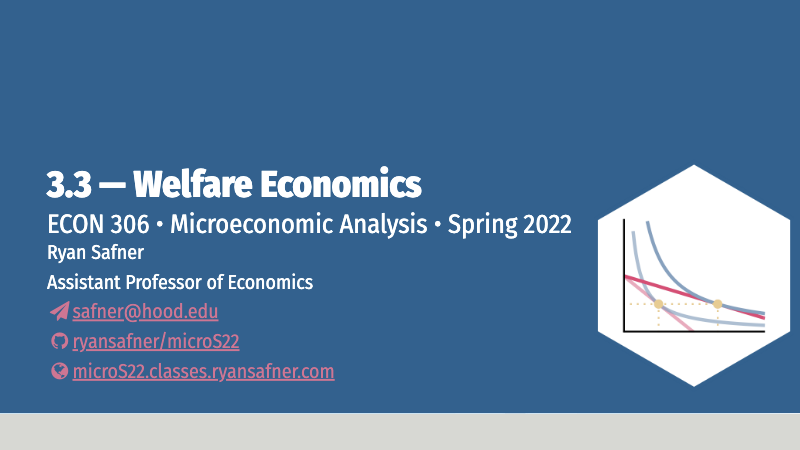Overview
Today we consider how markets work and why (and when) they are so efficient at allocating resources and solving social problems. We take a crack at defining efficiency in a few ways: allocative, productive, Pareto, and Kaldor-Hicks efficiency. We then discuss Welfare Economics and I summarize three conditions about when markets are good & efficient: 1. Markets are competitive 2. Markets reach equilibrium 3. Markets do not have externalities
This leads us into a discussion of market failure, when markets aren’t efficient because something prevents the price system from working properly. We talk about several types of market failures: collective action problems, public goods, and externalities.
Readings
- Ch. 14.2-14.7, Ch. 16 in @textbook
Your textbook does cover efficiency and welfare economics in Chapter 14, in the context of general equilibrium theory, which is a bit too advanced for us to spend sufficient time to cover. Thus, I would not recommend reading that chapter unless you are prepared to dive into new tools (Edgeworth diagrams, production possibilities frontiers) that I will not cover in this course.
Chapter 16, however, is a pretty accessible discussion of externalities and public goods.
- Safner, 2020, “‘Public Good,’ or ‘Good for the Public?’ Political Entrepreneurship and the Public Funding of Scientific Research”
- Safner, 2016, “Institutional Entrepreneurship, Wikipedia, and the Opportunity of the Commons”
- Freakonomics Radio ep. 115: “Parking is Hell”
- MR University: “Trading Pollution: How Pollution Permits Paradoxically Reduce Emissions”
- MR University: “Externalities and Incentives: The Economics of COVID (Vaccines)”
- The Lorax (Dr. Seuss: “How Bad Can I Be?”
- NPR: “The Nobel Laureate Who Figured Out How To Deal With Annoying People”
- MR University: “Women in Economics: Elinor Ostrom” (solving tragedy of the commons)1
- Iannaconne, 1992, “Sacrifice and Stigma: Reducing Free-riding in Cults, Communes, and Other Collectives”
- Econtalk: Iannaconne on the Economics of Religion
The following Wikipedia entries can also provide more background on today’s concepts (which are well known and standard among economists):
Slides
Below, you can find the slides in two formats. Clicking the image will bring you to the html version of the slides in a new tab. Note while in going through the slides, you can type h to see a special list of viewing options, and type o for an outline view of all the slides.
The lower button will allow you to download a PDF version of the slides. I suggest printing the slides beforehand and using them to take additional notes in class (not everything is in the slides)!
Elinor Ostrom was the first woman to win an Economics Nobel prize. She was famous for her work in studying how good rules can prevent a tragedy of the commons for all sorts of common resources such as fisheries, forests, water, and other environmental resources.↩︎
